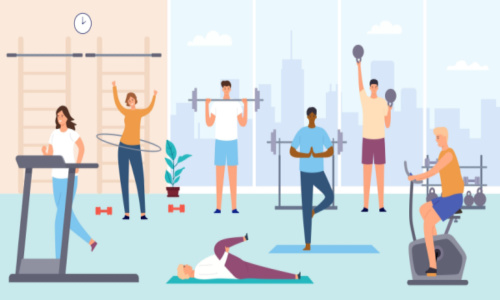5 beginner tips to overcome gym intimidation
1. The gym environment
Whether it’s a gym, studio, class or centre, stepping foot into a new environment can be intimidating, but you have to remember that these are the places where so many positive changes can happen such as:
- physical improvements
- supporting positive mental health
- building confidence
- establishing new or strengthening current relationships
- creating a sense of community.
Whilst these changes may not happen overnight, with the right amount of progress not only will you be able to achieve your physical goals, but you'll also begin to see positive changes in your self-growth.
If you’re feeling intimidated or nervous, it’s worth going in with a plan or an idea of what you want to get out of your session. Having a structure when you’re unsure can help you move from set to set without feeling like you have to work out what’s coming up.
You may find yourself unsure of how to use some of the equipment. Many of our Fitness and Wellbeing Centres will have support on gym floors to guide you if you have any questions about routines or equipment.
2. Worrying what other people think
This is one of the more common intimidations, but can easily avoided.

Remember that other gymgoers will have their own goals. They might be the same as yours, but they could be at a different stage or following a different routine, so avoid comparing or altering your routine.
Keep in mind, a Fitness and Wellbeing Centre can be a place to escape to. It’s a dedicated time and space for others to focus on themselves for both mind and body – it's unlikely they'll be thinking about you.
Lastly, don't worry about what other people think. You could say this is easier said than done, but if you feel that someone is staring or even goes as far as making comments, just think about the energy they are wasting focusing on someone else that could be put into themselves. You are doing this for yourself – no one else.
3. Personal barriers
“I’m not strong, fast, or good enough” are thoughts that we have all experienced at one time or another, and this is a common feeling around health and exercise. There are two ways to deal with this type of intimidation.
Set personal goals:
Before embarking on a new fitness, health or gym regime. Make a long-term goal, where do you want to see yourself in a year? Then break that down into month-by-month goals, and even further into week-by-week if you need to. This method gives you manageable goals that you can tick off as you go. It also makes the entire process feel less daunting as you’re accountable for what you want to do next.
Be kind to yourself:
We all know that life isn’t always perfect, and barriers can get in the way, but this isn't an opportunity for you to stop or give up. Setting bite-sized goals means that if you don't achieve one of your goals, you can revisit or go onto the next one without it impacting your long-term plans.
It’s much easier to be negative than it is to be positive. Recognising when you’re doing this and changing your thought process means you can focus on the good. For example, if you’re starting out and feel the session didn’t go as planned, don’t see it as a ‘wasted effort’, praise yourself that you showed up and moved your body.
4. The fear of the unknown
With so many different training styles, guides and formats being so readily available to us, you may find the amount on offer can become overwhelming.

To reduce these fears, revisit the reasons why you're looking for something new. As above, focus on the goals that you have set and think about how you are going to get there. If you’re unsure about a new training format, do some research or speak to a Personal Trainer to get some additional information on whether it may be suitable for you or not. You can always try something out and, if it’s not for you, try something else.
Remember, fitness can be tough at times, but there’s a difference between it being tough and enjoying it, and it being tough and you hating it. You’ll be much less motivated and will look for ways to stop.
Finding something that works for you can be the deal breaker when it comes to sticking with it. Feeling confident in what you want to do, how you’re going to do it and ideally when you want to do it will always help to bring you back to the main priority.
5. Trying something new
It’s not just what’s on offer either, this can lead to feelings of inadequacy as you compare yourself to those who have been following a guide or style that you’ve been interested in trying for a while – automatically making them appear as ‘better’ than you.
This ties into the idea of being kind to yourself, but you also need to remember that everyone has to start somewhere – this has never been more true than in a health and fitness environment.
If you go in expecting to be the fastest, lift the heaviest, jump the highest or be the best, you are automatically putting pressure on yourself which is, often unattainable. In these situations, stay grounded and remember; you showed up and moved your body. Every time you do this, and do it consistently, you'll progress in reaching your goals.
Trying something new is always tough. If it’s a class or workout, you could always bring a friend to attend with you to build your confidence. Alternatively, get in contact with a Personal Trainer or your local fitness and wellbeing centre to share that you are new, as adjustments can be made to exercises to cater for those who aren’t as advanced.
If you’re interested in starting a new health and wellbeing regime in 2023, or would like to hear more about Nuffield Health’s Fitness & Wellbeing Centres, Click here
Related Video: Full Body Workout With Dumbbells | Strength Training
This video is part of our on-demand 24/7 content. To view more videos and subscribe to our 24/7 virtual gym click here.
Last updated Monday 8 July 2024
First published on Friday 23 December 2022

